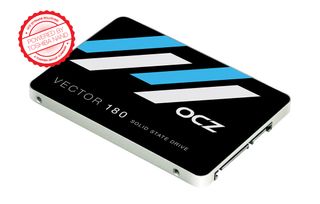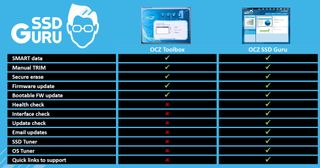OCZ Releases Vector 180 SSD And New SSD Guru Management Tool
OCZ Storage Solutions, a Toshiba Group Company, released the new Vector 180 series today. The Vector 180 is a continuation of the Vector 150 theme that adds new features to make it more cost-competitive and reliable. The Vector 180 utilizes the same OCZ-proprietary Barefoot 3 controller found in the Vector 150 but switches from first-gen Toshiba 19 nm to second-generation Toshiba A19 nm NAND. This may appear to be a small change, but it will result in a more competitive price point for the end customer.
Performance metrics remain fairly static at 100,000 / 95,000 random read/write IOPS, and sequential speed remains near the limit of SATA 6 Gbps at 550 MBps and 530 MBps sequential read/write. OCZ also expanded capacity by adding a beefy 960 GB model to the existing 120 GB, 240 GB and 480 GB capacity points.

OCZ's reputation for reliability took quite a beating prior to the Toshiba acquisition, but in fairness, this was largely due to the nature of being a third-party manufacturer. Relying on another company's SSD controller left OCZ holding the bag when it went south, but OCZ's move to its own Barefoot 3 controller and Toshiba NAND has worked wonders for its reliability.
OCZ recently released reliability data to the public, which in and of itself is quite the feat. We almost never see storage reliability data of any ilk released to the public. This laudable disclosure highlighted the impressive gains OCZ has made since it moved to its own silicon and Toshiba flash, but OCZ isn't content to stop there.
The Vector 180 became one of the few client-oriented SSDs to sport a tantalum capacitor for power-fail protection. OCZ has dubbed this its PFM+ (Power Fail Management) architecture, and it involves a combination of hardware and firmware that will ostensibly lower the already-impressive RMA rate. Only time will tell how this new feature will impact reliability metrics, but it is nice to know that OCZ will step up and share that data in the future.

OCZ also injected some notable upgrades into its new OCZ SSD Guru software. This SSD management suite adds a host of features that weren't available in the old OCZ SSD Toolbox and is a bit more pleasing to the eye, as well.
The current crop of 2.5" SSDs have saturated the ubiquitous SATA 6 Gbps connection, and the only path to unlocking radically faster speed is to move to PCIe-based SSDs, be they m.2 or otherwise. Unfortunately, the m.2 segment is far from mature at this time, which equates to high prices and low warranty periods. Speaking of warranties, the Vector 180 offers OCZ's 5-year ShieldPlus warranty. ShieldPlus offers cross-shipping and paid returns, which puts it among the best available.
Stay on the Cutting Edge
Join the experts who read Tom's Hardware for the inside track on enthusiast PC tech news — and have for over 25 years. We'll send breaking news and in-depth reviews of CPUs, GPUs, AI, maker hardware and more straight to your inbox.
The best SATA 6 Gbps SSDs feature great reliability and low cost, and the Vector 180 aims to put OCZ's stamp on both categories. For a complete look at the newest SSD on the block, jump over to our OCZ Vector 180 960 GB SSD Review.
Follow us @tomshardware, on Facebook and on Google+.

Paul Alcorn is the Managing Editor: News and Emerging Tech for Tom's Hardware US. He also writes news and reviews on CPUs, storage, and enterprise hardware.
-
Nuckles_56 sequential speed remains near the limit of SATA 6 Gbps at 550 MBps and 530 MBps sequential read/write.Reply
I'd say that should be MB/s otherwise that is one slow SSD -
WFang I see what you're saying but I think you're wrong in your interpretation. Just because there is a 'p' doesn't mean MBps == Mbps... It's the capitalization of the B that makes the difference, the p is just short-hand for 'per' as in 'per second'.. and if we really want to be splitting hairs, I would like to know if these numbers are MB per second or MiB per second... :)Reply -
PaulAlcorn Megabytes per second (MBps). As per most of the storage world (at least the marketing side) they are using MBps instead of MiBps (MiB/s). MiB is not widely used, unfortunately, so we stick with the most popular (and thus recognizable) unit.Reply -
medmn Wouldn't buy anything from OCZ - or anything marked OCZ - I have a pile of failed OCZ products with "lifetime warranties" and no means of collecting any compensation under the warranty.Reply -
jonathan1683 Reply15549536 said:Wouldn't buy anything from OCZ - or anything marked OCZ - I have a pile of failed OCZ products with "lifetime warranties" and no means of collecting any compensation under the warranty.
exactly they don't honor their warranty. My pc couldn't make it overnight without a BSOD and it was always crashing stuttering and would freeze for many seconds at a time loading stuff. Finally wouldn't even show up in the bios. Sent it back and they returned it to me as in perfect condition no problem found. Just got a Evo 850 pro and my pc is stable as a rock. -
synphul I installed a 240gb vector 150 in a machine several months ago and it's been solid as a rock too. Normally I wouldn't have bothered but the vector series with the new toshiba nand is a pretty good drive. If the prices come down I might consider one of these vector 180's. Hard to beat when I got the 150 on sale for $60 for 240gb.Reply -
photonboy OCZ was bought out by Toshiba so don't go by products before that.Reply
Having said that I'll stick with Samsung unless some other company can significantly undercut their prices or prove more reliable.
Most Popular



